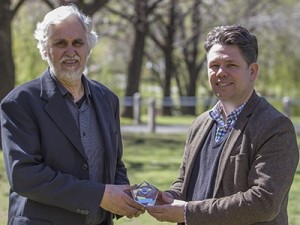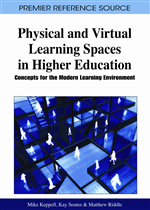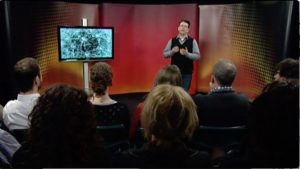My Big Fat Idea: educational designs for mobile learners
My big fat idea is this. I think we need to be able to design learning experiences for students in a way that is informed by their real, everyday experience. Check out my talk for the Big Fat Ideas series here.
Best Paper at WSSD-U-2014

My colleague Colin Hocking and I were delighted to learn that we had won First Prize for Best Paper when Colin presented at The 2nd World Symposium on Sustainable Development at Universities (WSSD-U-2014) last month in Manchester. La Trobe UniNews did a little article on it here:
LTLT academics receive prestigious award for sustainable thinking.
Handbook of Design in Educational Technology
At long last, the release of The Handbook of Design in Educational Technology, Chapter 2 of which is by Mike Keppell and me about the evaluation of learning spaces. I’m looking forward to getting my hands on this book myself! Here’s the blurb:
The Handbook of Design in Educational Technology provides up-to-date, comprehensive summaries and syntheses of recent research pertinent to the design of information and communication technologies to support learning. Readers can turn to this handbook for expert advice about each stage in the process of designing systems for use in educational settings; from theoretical foundations to the challenges of implementation, the process of evaluating the impact of the design and the manner in which it might be further developed and disseminated.
The volume is organized into the following four sections: Theory, Design, Implementation, and Evaluation.
Using student perspectives in learning space design
For the last few years I have become interested in finding meaningful ways to reintroduce student perspectives into the way we think about university teaching and learning. It may seem totally obvious that we should think about how students experience their daily lives when we plan for and design curriculum, student support, educational technology and learning environments. However after working in universities for a long time, I have noticed that important decisions are frequently made by senior management, administrators and teaching staff who are all prone to making one simple mistake. They (and I include myself here) extrapolate their own experience as a learner — often decades in the past. Not only are student lives different now than they were before. Student experiences are very different depending on discipline, course load, cultural and social background, and all kinds of other factors that are very difficult to summarise.
In other words, while we think we understand the broad issues, at the level of an individual student the picture is complex, unpredictable and highly contingent. What typically happens in the face of this is to survey students once in a while and pool all the data. Of course this can help, but we end up with a lot of assumptions. I think we need much better ways to describe the everyday experiences of students. One of those ways is to get students to work as co-researchers, giving us richer and deeper descriptions of their daily lives, providing more detailed evidence alongside what we already know (for example the Day Experience Method that Mike Arnold and I developed).
Since getting involved in the Spaces for Knowledge Generation project, I have started to work on ways to take some of the lessons we can learn from these methods and use them in the design of physical and virtual learning spaces. This week an article I wrote with Kay Souter on this approach was published in the Journal of Learning Spaces, here:
Designing informal learning spaces using student perspectives
This is a brand new journal and I submitted the article there because I want to encourage more scholarly work in this area and there was previously no journal like it. If you’re interested in learning spaces design, I hope you enjoy reading it.
Learning Spaces book available for pre-order
 I’m very excited that our new edited book on learning spaces is finally available for pre-order. There are more details including the preface on the IGI Global website:
I’m very excited that our new edited book on learning spaces is finally available for pre-order. There are more details including the preface on the IGI Global website:
Physical and Virtual Learning Spaces in Higher Education: Concepts for the Modern Learning Environment documents real-world experiences of innovators in higher education who have redesigned spaces for learning and teaching. The redefined spaces encompass a broader range of physical, virtual, formal, informal, blended, flexible, and time sensitive factors.
You can order it on Amazon.com.
Letter to the Prime Minister
Dear Prime Minister,
I write to urge the government to reconsider its decision to axe the Australian Learning and Teaching Council (ALTC). While I am a strong supporter of appropriate funding for the reconstruction work in Queensland, Victoria and beyond following the recent natural disasters, I do not believe this decision has been made in the best interests of the nation.
I believe events such as the Victorian bush fires, the Queensland floods, and Cyclone Yasi prove that the Australian government needs to fundamentally alter its thinking on disasters. The government should recognise that we cannot sustain a situation where we must find several billions of taxpayer dollars on an ad hoc basis every time one of these disasters comes along. Of course I will gladly pay the one off levy for the Queensland floods, but I would be even more supportive an ongoing approach that would to pay for a disaster contingency fund for all Australians. With a mining boom, our continued economic growth and projected budget surpluses, this country should be able to compare itself to the Norways instead of the Naurus.
The ALTC is a success story in Australian higher education, and this industry is one of Australia’s largest exports. I have worked in higher education for my entire career since 1990. During this time, I have seen student learning suffer from being vastly undervalued in comparison to research, yet I have seen a great deal of evidence that both are of equal importance. Without excellence in teaching, the top researchers of tomorrow will not be supported to continue in universities. The ALTC was an important way that this imbalance was being addressed in recent years, by rewarding and recognising excellent teachers, and by supporting applied research projects into teaching and learning. Its demise is a giant step backwards for all Australian universities.
I have been lucky enough to be involved in an ALTC funded project on learning spaces. As an early career academic, this is a significant boost to my professional development, but far more importantly it is now having a significant impact on the outcomes for students in my university and beyond, through the establishment of a range of exciting new study environments, including several new collaborative teaching spaces, and the setting up of Faculty learning commons at La Trobe. Our work is being disseminated nationally, and in the coming months my team will publish an edited book internationally. Each of these outcomes — academic development, evidence-based capital investment, student support, and publishing of research — have been made possible only because of the support of the ALTC. This is the sort of thing that will be crushed by the removal of a relatively small amount of government funding necessary to keep the ALTC going.
With changes coming through the Bradley Review and the establishment of TEQSA, as well as important challenges in attracting international students to Australia, it is clearly vital that the government gets the balance right in supporting universities right now. The government will fail in its goal of improving the quality as well as access to higher education in this country if its approach does not include supporting educators through programs such as ALTC. These goals are in tension, and cannot be achieved through regulation alone. Please stand up for the quality of higher education by immediately reviewing the hasty decision to discontinue the good work of the ALTC.
Kind regards,
Matthew Riddle
. . . . . . . . . . . . . . . . . . . . . . . . . .
Matthew Riddle
Senior Lecturer (Academic Development)
Faculty of Law and Management | La Trobe University | Bundoora, Vic 3086
Enrolling for the DJ Masterclass
We kicked off with Part 1 of the DJ Masterclass on Monday night, and dare I say it, I think it was a raging success! The recording came out really well I think — I actually had two different methods on the go and both worked. One became a slide-show podcast and the other is just an audio podcast (with a mic in the centre of the table to capture discussions). I think I’m going to continue doing that for the whole series.
I’m now getting more and more inquiries about the class, and we’re running a little online poll about the cost of the course. Basically almost everyone’s telling me it should be exactly the same price as the face to face class ($20 for 3 classes), so I’ve now set up automatic enrolment via PayPal. So if you want to enrol, it’s definitely not too late, just go here:
https://www.matthewriddle.com/moodle/
DJ Masterclass video
If you’re interested in being involved in the DJ Masterclass, drop me a line and I’ll enrol you!
DJ Masterclass next week
The DJ Masterclass is due to start on Monday week. Since my original email, I’ve been contacted by about 6 or 8 DJs from places outside of Melbourne — people who would like to be here but who can’t. Some are within Australia, and some aren’t.
I’m considering trying to put some of the materials, capture some of the conversations, and even perhaps putting together some new materials so that someone could actually take part in the DJ Masterclass at a distance. For example I’ve begun talking to some international DJs about recording interviews over Skype, and we could even potentially have an online conference using Skype with some of the DJs who aren’t able to be there (the venue has broadband).
I’d like your feedback on whether you think this idea is worth the effort. If the Monday night time slot is not suitable for you, you know of people who would like to be involved but can’t, or you just think it would be cool to review this stuff at a later date, could you let me know?
A reminder that the DJ Masterclass is a 3 week course, starting on Monday October the 19th at 7pm. Since I am putting some resources online in Moodle, you’ll need to enrol beforehand by sending me an email at matthew@matthewriddle.com.
DJ Masterclass Flyer [PDF, 102K]
